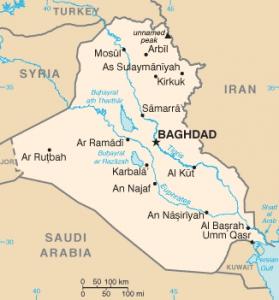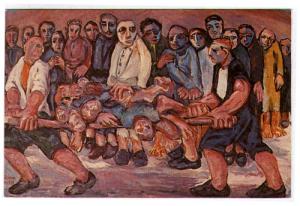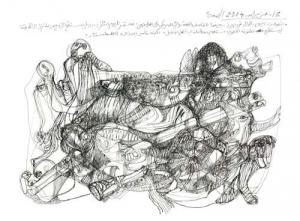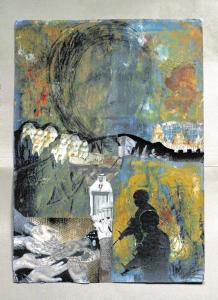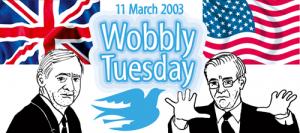The invasion and occupation of Iraq resulted in approximately half a million war-related deaths during the eight-year period March 2003 – June 2011, according to the results of a peer-reviewed household survey* published in the journal PLOS Medicine (PLOS stands for ‘Public Library of Science’).
The paper estimates that ‘more than 60% of excess deaths were directly attributable to violence, with the rest associated with the collapse of infrastructure and other indirect, but war…
Iraq
Anti-war campaigners and academics have been quick to charge that a major study into congenital birth defects in Iraq, published on 11 September, has been manipulated to serve the interests of the US, which contaminated parts of Iraq with depleted uranium and other heavy metals. After contacting a number of those involved, PN has found no evidence of manipulation.
The summary report*, published on 11 September by the Iraqi…
Halabja Chemical Bombing, 1988, oil (120 x 100cm), Saqqez. IMAGE: Osman Ahmed.
There were many chemical attacks on Kurdish villages in northern Iraq by Saddam Hussein’s army in 1987 and 1988. Osman himself was a witness and victim of the chemical attack and once went blind for a few days, hiding in a cave.
This image was made in 1988 after the attacks and…
Satta Hashem grew up in Buhrez, Diyala province, and left Iraq in 1978 aged 18, having been involved in opposition to Saddam Hussein’s regime. He trained in Algeria and the Soviet Union, later moving to Sweden and then the UK. He has kept a daily diary of drawings throughout the wars of 1990-1 and 2003-. A departure from his practice in painting, in which Hashem draws on scientific theories of…
In 2003 the UK and US invaded Iraq without a UN resolution. This is common knowledge to anyone who was old enough to pay attention to the news at the time and the following years. Many in my generation also attended the anti-war marches that were organised not only in Britain but across the world, although the London march, attracting between one and two million people according to different estimates, was clearly the largest and attracted the most attention.
What may not be as…
The ‘By the Waters’ performance in Chapter Gallery, Cardiff was conceived by Cardiff-based British-Iraqi artist Rabab Ghazoul to commemorate the tenth anniversary of the second Gulf War. Unsure how to mark the day, Ghazoul decided to create an event that would offer a contemplative space that addressed mourning and remembrance while allowing people to consider and experience in a different way.
Written specifically for the event, the text of Ghazoul’s six-part…
Despite a torrent of commentary in the British media to mark the tenth anniversary of the invasion of Iraq, there has been little or no reflection on what turned the largely-unopposed invasion in March 2003 into a guerrilla war that began two months later.
A double massacre in the largely Sunni town of Fallujah in central Iraq played a crucial role in galvanising the Sunni insurgency.
According to reports, during the US-led invasion in March, Iraqi troops…
Saturday was the 25th anniversary of the March 16, 1988 gassing of the town of Halabja, which is north-east of Baghdad and whose backdrop is the mountains that make up part of the Iran-Iraq border. This attack killed upwards of 5000 civilians, mostly women and children, injuring thousands more as Iraqi planes dropped chemical bombs on the town.
Having previously visited the town in April 2009 I returned to Halabja on…
Back in November I wrote a blog piece for Peace News about what was essentially a media blackout on cross-border attacks by the Turkish military into the northern regions of Iraq. These Turkish attacks into Iraq have a long and deadly history, taking and disrupted many lives and have historically, in the main, been largely under-reported or simply unreported. It is in part…
Stop #8, 2005 Kennardphillips
On 19 March 2003, the United States and Great Britain embarked on the invasion and occupation of Iraq. Widely considered one of greatest foreign policy disasters of modern times, the war was only the latest in a series of western military interventions in the country over the course of the last century. A decade on from the invasion, the war is being revisited in British public culture across newspaper articles, television…
As we mark the tenth anniversary of the invasion of Iraq, there is a general understanding, perhaps even a global consensus, that lies were told to justify the war. The most important of these lies, however, is rarely discussed, or even noticed.
On 25 February, former British prime minister Tony Blair made a last throw at justifying the war: ‘If we hadn’t removed Saddam from power just think, for example, what would be happening if these Arab revolutions were continuing now and Saddam…
The crowd reportedly threw bottles of water and stones at the soldiers, who responded with live fire. According to Reuters, some shooting occurred after protestors set a military vehicle on fire, but it is not clear whether this happened after protestors had already been killed.
The killing (by US soldiers) of 15 unarmed demonstrators in Fallujah in April 2003 is believed by many commentators to have been the spark that started the armed Sunni insurgency against the US occupation…
Thanks to your generosity we've already reached our original goal of raising £1,250 towards the costs of publishing Ian Sinclair's new book "The march that shook Blair: An oral history of 15 February 2003" (see below). However, further backing is still very valuable, as this will enable us to do additional promotional work for the book; and pay for some of the unpaid work that has already gone into the production (eg.…


